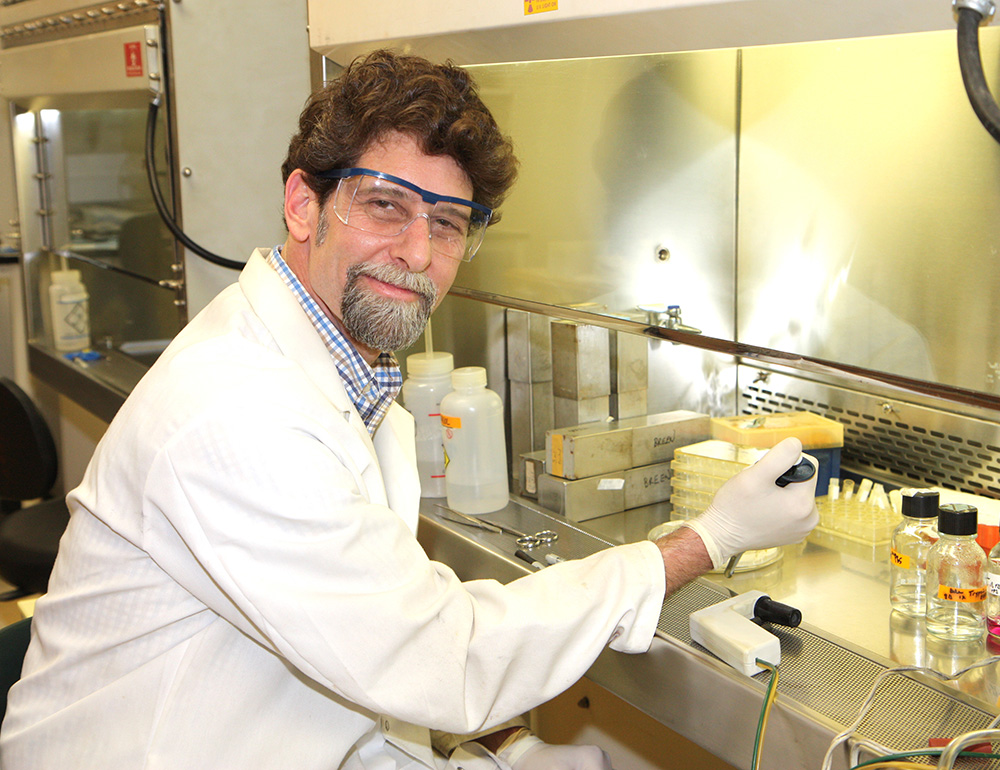
Dr. Paul Pantano, associate professor of chemistry, works with undergraduate students in his laboratory and helps place young researchers in other UT Dallas labs through three programs.
Dr. Paul Pantano, associate professor of chemistry at The University of Texas at Dallas, recently received the 2014 Provost’s Award for Faculty Excellence in Undergraduate Research Mentoring.
Created by the Office of Undergraduate Education and the Office of the Provost, the award recognizes a faculty member who excels in the development of UT Dallas undergraduates into future researchers. He received the honor last month at the annual UT Dallas Honors Convocation.
In addition to the mentoring award, Pantano earned the 2014 Outstanding Teaching Award for a faculty member from the School of Natural Sciences and Mathematics.
Pantano credits his mentors for his interactions with students.
“I was lucky to have good mentors myself, all the way from high school to the present day,” he said. “In fact, when I learned of these awards, I emailed my former mentors, including several of them on this campus, and thanked them for their influence on me, which in part led to this recognition.”
Pantano earned a PhD in analytical chemistry from the University of California, Riverside and joined the faculty of UT Dallas’ Department of Chemistry in 1996.
His research involves characterizing and assessing the potential toxicity of nanomaterials used in medicine and the semiconductor industry. Pantano teaches quantitative methods in chemistry, a class for sophomores that transitions students from freshman laboratory courses to upper-level undergraduate labs.
“I was lucky to have good mentors myself, all the way from high school to the present day. In fact, when I learned of these awards, I emailed my former mentors, including several of them on this campus, and thanked them for their influence on me, which in part led to this recognition.”
Dr. Paul Pantano,
associate professor of chemistry
“As students write up their research reports, I emphasize the executive summary,” Pantano said. “Whether you’re a fast-food restaurant manager or president of the United States, when it comes time to request more money or people or propose new ideas, you’re going to have to get your point across quickly and convey sound arguments based on data.”
In addition to working with undergraduate students in his laboratory — he currently hosts five — Pantano helps place young researchers in other UT Dallas labs through three programs. He is site director of the Robert A. Welch Foundation Summer Scholar Program in the Department of Chemistry, as well as scientific advisor for the Anson L. Clark Foundation Summer Scholar Program and the UT Dallas/Plano ISD Summer Intern Program in the Office of Undergraduate Education.
Pantano also helps high school students make the transition to college and incoming UT Dallas freshmen assimilate to their new academic departments.
He said the lessons undergraduates learn while performing research provide important skills necessary to succeed in an increasingly competitive workforce. For example, student researchers gain experience analyzing and questioning data, and making decisions based on that data.
Interdisciplinary research is an especially high priority.
“Undergrads really benefit from interdisciplinary research because the extensive range of skills they garner provides them with a strong basis for careers in science and technology fields,” Pantano said.
Whether a top company, medical school or graduate school, a student’s next institution will likely be impressed by interdisciplinary lab work, Pantano said.
“What they are especially impressed by is seeing an undergraduate’s name on a paper published in a scientific journal,” he said. “I know many UT Dallas students who work hard in our labs and contribute significantly to our faculty’s research, and who very deservingly are rewarded with co-authorship on papers.
“All these things resonate with prospective students and their parents — where can students go to college and get this kind of attention? The answer is UT Dallas.”